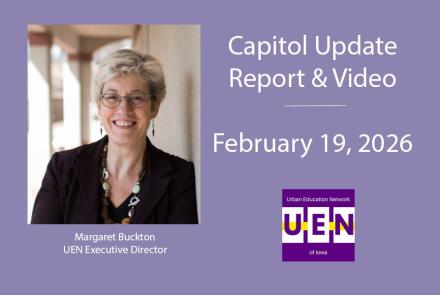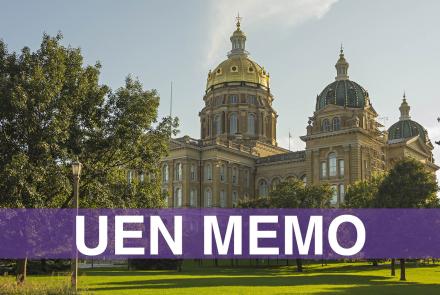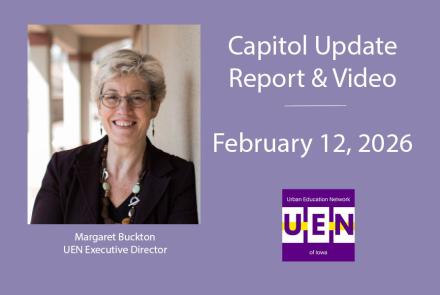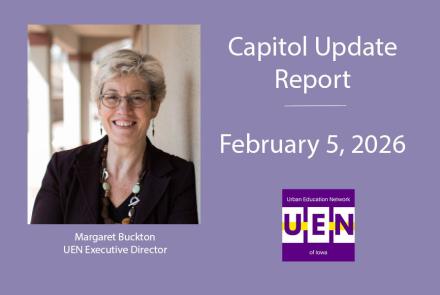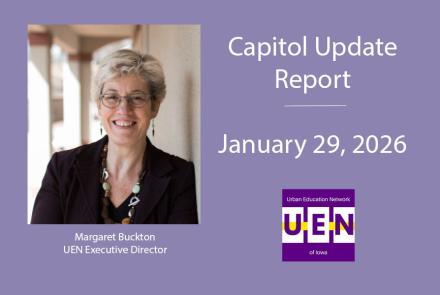Capitol Update - April 27, 2023
UEN Legislative Update
April 27, 2023
Download the print-friendly UEN April 27, 2023 Weekly Report
This UEN Weekly Report from the 2023 Legislative Session includes:
- HF 604 Student Discipline Policies moves in the Senate
- Appropriations Kick into Gear on the State Budget
- Other House and Senate Action
- Bills Receiving Committee Action
- Dueling Property Tax Proposals in the House and Senate
- Understanding Enactment Dates: When do bills become law?
- Last Legislative Deadline
- Advocacy Action
- Links to Advocacy Resources
HF 604 Student Discipline Policies moves in the Senate:
Senate strike-after amendment dramatically improves the bill.
- Requires DE to produce a list of code/rule references for all required professional development (PD) and training. Requires schools districts to notify staff of the state/federal requirement for the PD (including Chapter 284 Teacher Quality).
- Requires district to give copy of Iowa Code 280.21 (Corporal Punishment) to teachers with an initial contract and annually with contract renewal.
- Requires the student handbook provided annually to parents of students including the discipline policy. Requires the parent to acknowledge receipt of the handbook, either in writing or electronically.
- Requires the state Ombudsman to investigate a complaint by a BOEE licensed individual related to violence in the classroom, including retaliation regarding reporting. The Ombudsman must provide a report to DE & BOEE and keep the complainants’ identity secret.
- Requires classroom teachers to report threats or incidents of violence resulting in injury, property damage or assault by enrolled students to either the principal or a lead administrator within 24 hours. Allows the teacher to notify the parent of the offending student or the parent of a student threatened or injured. Requires principal/lead administrator to notify parents, of both offending student and student threatened or injured, within 24 hours after the classroom teacher reports the incident.
- Prohibits retaliation for disclosing information to any public official or law enforcement agency, including Ombudsman, if the employee/contractor reasonably believes the information evidences a violation of law, rule, mismanagement, gross abuse of funds, abuse of authority, or substantial and specific danger to public health or safety. Defines “disciplinary action”.
- Requires school boards to adopt, in collaboration with teachers and administrative staff, policies for different grade levels describing how the district may discipline a student for a threat of violence or causing such an incident. Requires board policy to include the following:
- Strategies designed to correct the student’s behavior.
- Provide for parent conference, counseling or mental health counseling sessions, when appropriate, including prior written parent consent for MH counseling.
- Must be consistent with special education law.
- Provide for escalating levels of discipline.
- Allows the district to select the appropriate level of discipline corresponding to the severity of the incident.
- Allows districts to suspend the student, permanently remove the student from a particular class, expel, or place student in alternative learning environment, including a therapeutic classroom if appropriate and available.
- Requires an IEP meeting if offending student has an IEP.
- Requires the district to publish the policy on the school district’s website.
The bill as amended, was approved in the Senate, 49:0, and returns to the House. UEN is registered as undecided on the amendment.
Appropriations Kick into Gear on the State Budget:
This chart from the IALNS Newsletter shows this week’s action on several appropriations bills. The Senate has passed four of the bills. The House has several that were approved in subcommittee and Appropriations Committee on Thursday. The Standings Appropriations bill, which includes state foundation aid and a few other appropriations impacting schools, has not yet been introduced in either chamber.
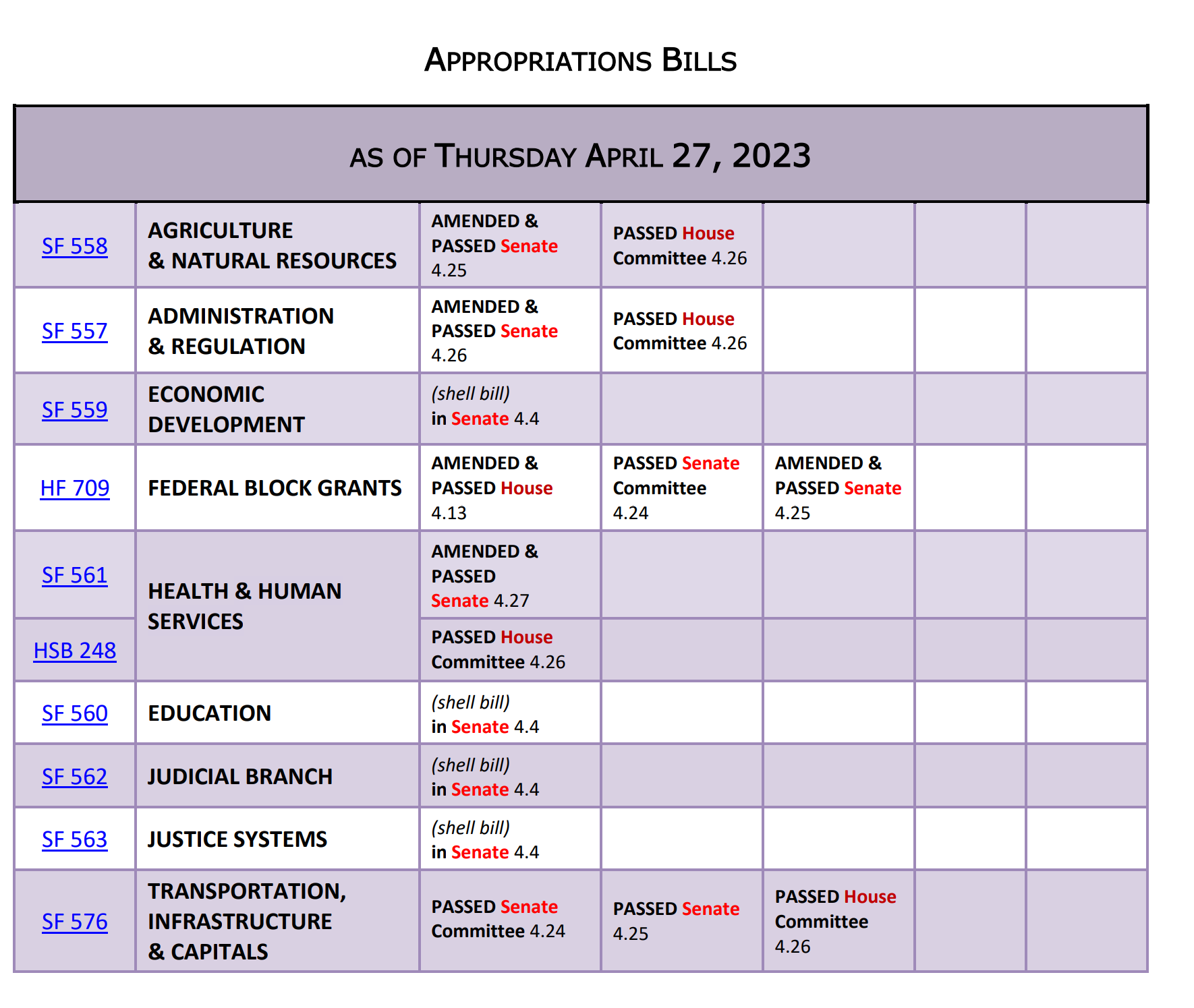
- HF 256 Age of Licensure: lowers the minimum age of applicants for licenses from BOEE from 21 to 18 years. The Senate approved the bill, sending it to the Governor. UEN supports.
- HF 602 Suicide Hotline: requires school districts to publish the phone number and website of a suicide hotline on Student ID Cards for grades 7-12 and may include them on ID cards for students in grades 5-6. The bill was amended to allow but not require districts to use up existing card stock before being required to include the information. The bill as amended goes back to the House. UEN is registered in support.
- HF 614 Licensure Reciprocity: Requires BOEE to license individuals from other states or nations who have completed the necessary coursework to be licensed in the other state/county, even if they did not have a passing score on a test such as the PRAXIS. The Senate approved the bill, sending it to the Governor. UEN is registered in support.
- SF 546 Electronic Notices: this bill originally allowed all public notices, including minutes, agendas and budget certification publications to be posted on a website developed and maintained by the Secretary of State’s office. The bill was heavily amended, and stripped down to just pertaining to publication of bond sales notifications through a national publication specifically for that purpose, and also allows notices of a school board’s intent to fill a vacancy on the school board to be posted on the district’s website. One key change is actually a mandate on newspapers. Newspapers are required to post public notices on their website, open to all (not subject to subscription or a paywall) within 48 hours of receiving the notice. The date of publication on the website serves as the date of compliance for meeting the requirements of the statute. Additionally, if a newspaper doesn’t have a website, they can satisfy the requirement by posting electronically on the Iowa Newspaper Association’s public notice web page. UEN is still registered in support, but this bill does not provide the publication cost relief we preferred from the original version. The Senate passed the bill, 37:12, sending it to the House. It is assigned to the House Ways and Means Committee.
Bills receiving Committee Attention:
- HF 672 MA+ permanent Teacher License: allows educators with masters’ degree or higher and 10 years or more experience to remain licensed without requiring continuing education units (CEUs). The teacher must undergo a background check through BOEE and the district is allowed but not required to charge the teacher for the check. The bill requires licensed educators meeting these criteria who do evaluations to renew their evaluator approval every 10 years. Approved by Subcommittee 4.25.23, but still in the Senate W&M Committee (as is SF 392 Teacher Recruitment/Retention Omnibus that has management fund for recruiting/retention plans). UEN supports this bill.
- SF 572 ESA Clean-up and Tax Credit Changes: requires a student participate in consecutive years (transfers funds remaining in the ESA account and closes the account if a student does not re-enroll in a private school for a subsequent year after receiving the ESA). Eliminates public school provision of textbooks to private schools effective July 1, 2025. Prohibits taxpayers from claiming ESA payments for tuition and textbook tax credit purposes retroactive to tax year beginning Jan. 1, 2023. Lowers the School Tuition Organization cap from $20 million, to $17 million and then to $14 million in FY 2025 (still may be too high as nearly all students in private accredited schools will be eligible to receive an ESA by 2025). Requires money remaining in an ESA when a student withdraws, is expelled or does not re-enroll in a private school to be returned to the state. Also specifies that flexible use of talented and gifted ending balances only pertains to teacher salary supplement purposes (cross referenced back to IC 257.10, subsection 9). This section of the bill is retroactively to Jan. 24, 2023. The bill is on the Senate Calendar. UEN is registered in support.
Comparing Property Tax Proposals in the House and Senate:
 SF 569 Property Tax Senate Style and HF 718 Property Tax House Style bills are assigned to the Ways and Means Committees of the other chamber. See the April 20 Weekly Report for specific details of the bills.
SF 569 Property Tax Senate Style and HF 718 Property Tax House Style bills are assigned to the Ways and Means Committees of the other chamber. See the April 20 Weekly Report for specific details of the bills.
Extensive media coverage over the last week has sometimes suggested that these bills are very similar. They are not. This chart from the Iowans for Tax Relief compares the policies. There are only two areas of overlap, including transparency through notices to taxpayers and reducing the ability to bond. Even these areas of overlap have different policies to implement.
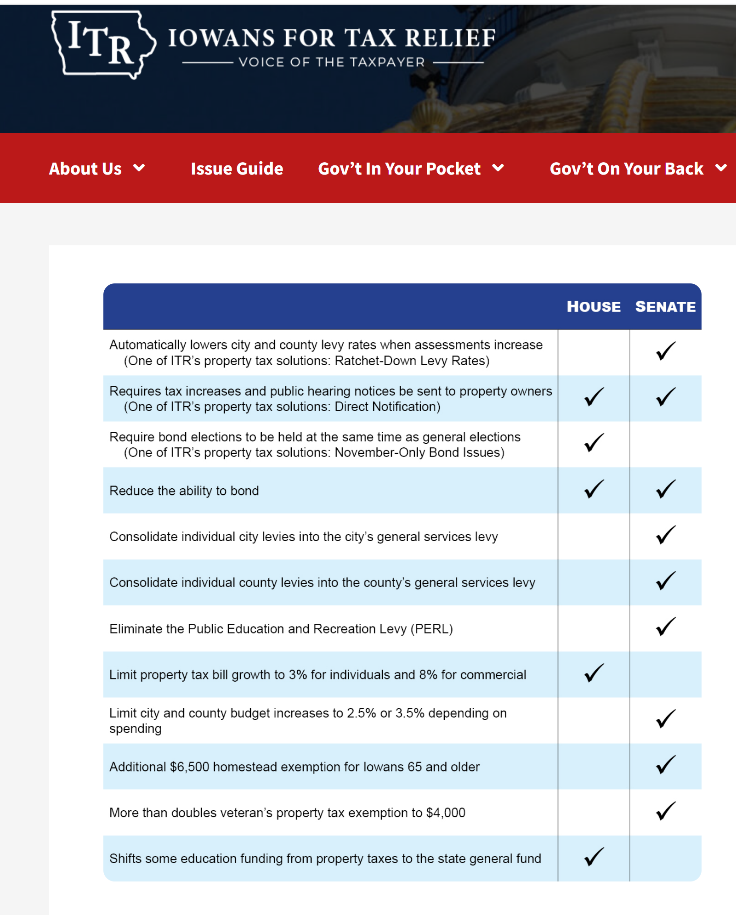
UEN is registered opposed to both bills. Interesting, that ITR is registered opposed to HF 718 since it uses the Taxpayer Trust Fund to pay for the $205 million annual cost of lowering the uniform levy through the school aid formula.
See advocacy action talking points below.
Understanding Enactment Dates:
With so many bills including different references to enactment dates, we thought this information might be helpful.
- If there is no reference to effective dates in legislation, the law is effective at the beginning of the upcoming fiscal year.
- “Effective on enactment" means it is the law the moment the Governor signs the bill (such as the bathroom bill this year).
- Contingent enactment is sometimes in a bill - something is effective if and when something else happens (e.g., contingent on an appropriation).
- Specified date - effective when specified (such as the elimination of the requirement to provide textbook support to private schools effective July 1, 2025).
- Retroactively effective - often in tax law, things are retroactively effective to the tax year beginning on a January 1, but sometimes policies are also retroactively applicable, typically to a fiscal year. A good example is HF 68, which allowed use of funds appropriated beginning the prior July 1 to be coded differently (like the TLC and TAG for TSS).
Last Legislative Deadline:
The next important deadline is April 28, when legislative per diem runs out. With the heightened intensity of appropriations actions, we expect adjournment of the Session as early as next week. The end of a legislative session can contain surprises, so stay tuned to your in-box until it’s done.
Advocacy Actions This Week:
- Say Thank You. Thanks to both Senators and Representatives for getting SF 391 Chapter 12 flexibility across the finish line. Also thank them for working on small policies regarding licensure to address the teacher shortage (see action above).
- Talk about Appropriations: Education Appropriations should be increased to support student mental health services, therapeutic classroom grants and early childhood. Encourage both Representatives and Senators to actually appropriate the $10 million in the standings bill for high-needs school grants, rather than cutting this appropriation at the end of session.
- Continue to express Concerns with Senators about HF 718 Property Taxes from the House and with Representatives regarding SF 569 Property Taxes from the Senate. UEN is registered opposed to both. Encourage thoughtful dialogue and a thorough understanding of process and fiscal impacts before moving forward. School districts already have levy limits and spending caps within the formula. Any property tax relief through the formula, such as lowering the uniform levy, will help to make taxpayers happy. Those investments should not, however, be confused with increasing resources for schools and students. Additionally, arbitrary growth caps on levies will alter the working of the formula regarding both student and taxpayer equity.
- Support SF 572 ESA Clean-up. Money should follow students back to the public school if they weren’t counted the prior October 1. The bill is now on the Senate Calendar.
- UEN Priorities: in every communication, find a way to mention poverty and preschool.
Connecting with Legislators: To call and leave a message at the Statehouse during the legislative session, the House switchboard operator number is 515.281.3221 and the Senate switchboard operator number is 515.281.3371. You can ask if they are available or leave a message for them to call you back. You can also ask them what’s the best way to contact them during session. They may prefer email or text message or phone call based on their personal preferences.
Find biographical information about legislators gleaned from their election websites on the ISFIS site here: http://www.iowaschoolfinance.com/legislative_bios Learn about your new representatives and senators or find out something you don’t know about incumbents.
Find out who your legislators are through the interactive map or address search posted on the Legislative Website here: https://www.legis.iowa.gov/legislators/find
UEN Advocacy Resources: Check out the UEN Website at www.uen-ia.org to find Advocacy Resources such as Issue Briefs, UEN Weekly Legislative Reports and video updates, UEN Calls to Action when immediate advocacy action is required, testimony presented to the State Board of Education, the DE or any legislative committee or public hearing, and links to fiscal information that may inform your work. The latest legislative actions from the Statehouse will be posted at: www.uen-ia.org/blogs-list. See the 2023 UEN Advocacy Handbook, which is also available from the subscriber section of the UEN website.
Contact us with any questions, feedback or suggestions to better prepare your advocacy work:
Margaret Buckton
UEN Executive Director/Legislative Analyst
margaret@iowaschoolfinance.com
515.201.3755 Cell
Thanks to our UEN Corporate Sponsors
Special thank you to your UEN Corporate Sponsors for their support of UEN programs and services. Find information about how these organizations may help your district on the Corporate Sponsor page of the UEN website at www.uen-ia.org/uen-sponsors.
|
|


